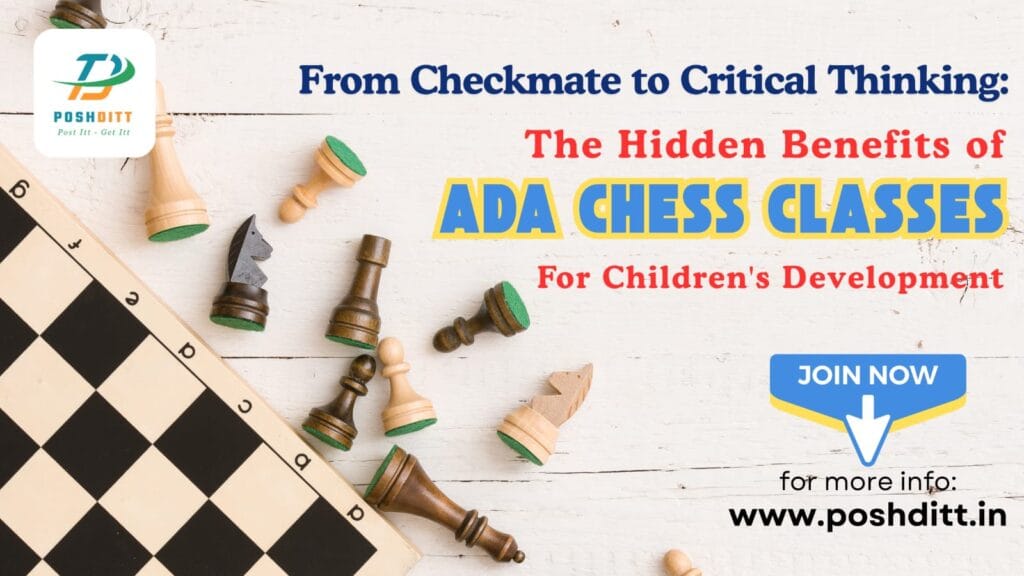- Tanisha
- October 16, 2024
Chess, often referred to as the game of kings, is not just a pastime; it is a tool for developing essential life skills in children. At Achievers Destination Academy (ADA), our Chess Classes go beyond the board, nurturing critical thinking, patience, and strategic skills. This blog post will explore the deeper benefits of chess and how ADA’s approach helps children excel in life beyond the game.

1. The Foundation of Critical Thinking Skills
Critical thinking is the ability to analyze information and make informed decisions. Chess inherently requires players to evaluate various possibilities and anticipate their opponent’s moves, making it a perfect avenue for developing this skill. In every game, children must assess the board, consider different strategies, and predict outcomes, thus fostering a critical thinking mindset.
At ADA, we prioritize critical thinking in our chess curriculum. Our experienced instructors guide students through various game scenarios, encouraging them to ask questions and think deeply about their choices. As they play, children learn to weigh pros and cons, which translates to better decision-making abilities in their academic and personal lives.
2. Strategic Thinking: Planning for Success
Chess is a game of strategy where every move counts. Developing a strategy involves looking ahead, planning for the future, and making adjustments based on new information. These skills are not only vital in chess but are also applicable in real-life situations, from problem-solving in school projects to making long-term plans for personal goals.
ADA Chess Classes focus on teaching children how to devise and implement strategies. By analyzing their opponent’s moves and considering different responses, students learn to think several steps ahead. This foresight nurtures a strategic mindset that benefits them academically and helps them navigate challenges effectively.
3. Patience: A Virtue Learned Through Gameplay
In a fast-paced world, patience is a virtue that often takes a backseat. Chess teaches children the importance of patience and the rewards that come with it. Each game requires players to take their time, think through their moves, and wait for the right moment to strike. This practice cultivates a sense of discipline and the understanding that not all actions yield immediate results.
At ADA, our instructors emphasize patience as a core value in our Chess Classes. Through guided play and thoughtful reflection, children learn that taking the time to consider their options often leads to better outcomes. This lesson in patience extends beyond the chessboard, teaching kids to approach challenges in life with a measured mindset.
4. Enhancing Concentration and Focus
Chess requires intense concentration and focus. Players must pay attention to the board and the nuances of their opponent’s strategy. This heightened focus sharpens children’s attention spans and improves their ability to concentrate on tasks, a skill that is increasingly valuable in today’s distraction-filled environment.
ADA Chess Classes incorporate techniques to enhance concentration. Through various exercises and games, students learn to block out distractions and hone their focus. This training helps children perform better in school, as they become more adept at concentrating on their studies and completing assignments.
5. Boosting Problem-Solving Abilities
Every chess match presents a new problem to solve. Players must navigate a variety of challenges, often needing to think on their feet and adapt their strategies quickly. This aspect of chess fosters strong problem-solving abilities, as children learn to analyze situations, identify solutions, and make adjustments.
In our Chess Classes, we encourage children to embrace challenges as opportunities for growth. By working through complex game scenarios, they enhance their problem-solving skills, which are transferable to academic subjects like math and science. This ability to tackle problems head-on will serve them well in future endeavors.
6. Social Skills and Sportsmanship
Chess is not just an individual game; it’s also a social activity that encourages interaction and communication. As children engage with their peers during lessons and tournaments, they develop social skills, learn about teamwork, and practice good sportsmanship. These interactions foster respect for others, whether winning or losing.
ADA creates a friendly and supportive environment where children can connect with their peers. Our Chess Classes promote teamwork through collaborative games and discussions. This social aspect helps children build friendships and improve their interpersonal skills, which are crucial for success in all areas of life.
7. Cultivating Resilience and Handling Failure
In chess, every player experiences defeat at some point. Learning to handle loss is an essential life lesson, teaching children resilience and the importance of perseverance. Rather than viewing failure as a setback, they learn to analyze their mistakes, adjust their strategies, and try again.
ADA Chess Classes help children develop this resilience by fostering a growth mindset. Instructors guide students through post-game reflections, encouraging them to learn from their losses. This process builds emotional strength, enabling children to face challenges in life with a positive attitude and determination.
8. Lifelong Learning: The Chess Advantage
One of the greatest benefits of learning chess is that it instills a passion for lifelong learning. Chess is a game with infinite possibilities, and there is always something new to discover. This ongoing learning process encourages curiosity and exploration, qualities that are vital for personal and academic growth.
At ADA, we nurture this love for learning in our Chess Classes. By exposing children to various strategies and techniques, we inspire them to continue their chess journey beyond the classroom. This enthusiasm for learning will extend to other subjects and interests, enriching their educational experiences.
9. Unlock Your Child’s Potential with Chess!
In conclusion, the benefits of ADA Chess Classes extend far beyond the game itself. Through critical thinking, strategic planning, patience, and problem-solving, children gain skills that will serve them throughout their lives.
Unlock your child’s potential with chess—book a chess demo session now! Join us at Achievers Destination Academy and embark on a journey where each move is a step toward personal growth, resilience, and success.
For updates and more details, visit: Achievers Destination Academy
Book Demo Here: Book a Demo Now
Author: Aditi Achievers Destination Academy
Search
Categories
- Abacus(11)
- Abacus Franchise(2)
- Abacus Workshop(1)
- ADA Chess(2)
- ADA French(3)
- ADA Talent Show(1)
- Art & Coloring Competition(1)
- Biology(1)
- Classes(1)
- Covid19(1)
- DATA Privacy(1)
- Hand Writing(3)
- Holistic Abacus(6)
- Holistic Handwriting(2)
- Holistic Learning(5)
- Holistic Memory Technique(5)
- Holistic Phonics(8)
- Holistic Public Speaking(3)
- Holistic Spell Bee(7)
- Holistic Vedic Maths(13)
- Home(5)
- Keyboard(1)
- Mental Maths Competition(1)
- Music(1)
- Online Classes(1)
- Online School(3)
- Phonics(4)
- Phonics Franchise(1)
- Schools(1)
- Spell Bee(5)
- Spell Bee Competition(10)
- Trending Topics- 2023(19)
- Uncategorized(6)
- Vedic Maths(6)
- Your Child(1)
Tags
Gallery





